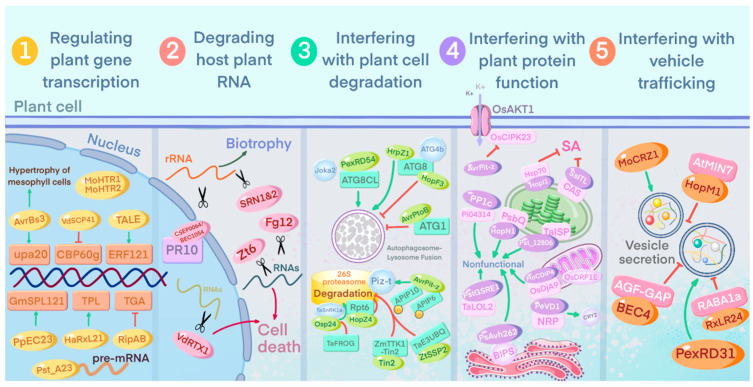Figure 4.
Effectors interfere with host plant cell physiological activities. AvrBs3, VdSCP41, TALE, PpEC23, HaRxL21, and RipAB have transcriptional activator-like activity and act as transcription factors that interfere with host cell degradation pathways, host protein function, and host vesicle transport, through regulating transcription of different genes, thus directly inducing the expression of plant genes. Nuclear effectors of M. oryzae MoHTR1 and MoHTR2 also reprogram the expression of immune-related genes in rice. In addition, the wheat stripe rust effector protein Pst_A23 suppresses host immune responses by regulating variable splicing of host disease-resistance-associated genes. Fusarium graminearum CSEP0064/BEC1054, F. graminearum Fg12, the secreted ribonuclease VdRTX1 of V. dahliae, C. orbiculare SRN1 and SRN2, and the wheat leaf blight effector Zt6 degrade host RNA and cause cell death. Phytophthora infestans effector PexRD54, P. syringae bacterial effectors HrpZ1, HopF3, and AvrPtoB employ different molecular strategies to regulate autophagy. P. syringae HopZ4, avrPiz-t, the U. maydis effector Tin2 launch an attack on the host ubiquitin-proteasome system to inhibit proteasome activity. Osp24 in F. graminearum, ZymosepVictoria tritici effector ZtSSP2, P. syringae effector HopI1, HopN1, wheat stripe rust Pst_12806, PstGSRE1, nucleophile integrin-like effector SsITL, Phytophthora sojae effector PsAvh262, AvrPiz-t, V. dahliae effector PevD1 and Phytophthora infestans effector Pi04314 act on different protein targets to exert pathogenic effects. P. syringae effector HopM1, rice blast fungus zinc finger transcription factor MoCRZ1, Blumeria graminis BEC4, Phytophthora brassicae RxLR24 effector and RXLR-WY effector PexRD31 in Phytophthora infestans are involved in the regulation of vesicle secretion.

